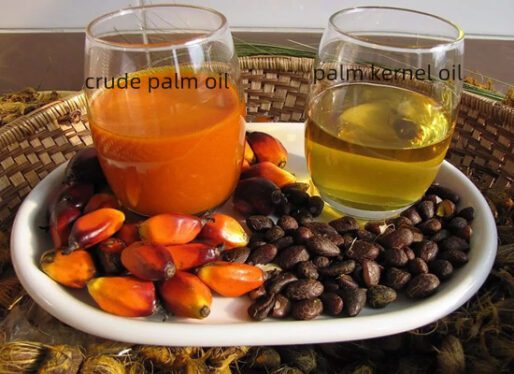Whether you’re frying up breakfast, sautéing veggies, or baking treats, your choice of oil matters more than you think. In today’s kitchen, palm oil, vegetable oil, and coconut oil are the most commonly used, but what makes them different? And more importantly, which one is right for you?
At SundryAgro Works, we’re passionate about giving you clean, honest insights into the food you eat. Let’s break down the truth about these three oils.
1. What is Palm Oil?
Palm oil is extracted from the fruit of the oil palm tree, mostly grown in tropical regions like Malaysia and Indonesia.
Nutritional Snapshot.
- 50% saturated fat
- Rich in Vitamin E (tocotrienols)
- Neutral flavor
- High smoke point (~450°F)
Pros
- Stable for high-heat cooking
- Longer shelf life
- Non-GMO by nature
Cons
- Controversial sustainability concerns
- High in saturated fats
SundryAgro Take
We support sustainably sourced palm oil that’s RSPO-certified, minimizing deforestation and protecting biodiversity.
2. What is Vegetable Oil?
Vegetable oil is often a blend of multiple plant-based oils like soybean, corn, sunflower, or canola.
Nutritional Snapshot
- Mostly polyunsaturated fats
- Typically refined
- Mild flavor
- Smoke point varies (~400°F)
Pros
- Budget-friendly
- Versatile for baking, frying, sautéing
- Light taste, doesn’t overpower dishes
Cons
- Highly processed (refined, bleached, deodorized)
- May contain trans fats if hydrogenated
- Often lacks micronutrients
SundryAgro Take
Check your labels. We recommend oils that are cold-pressed and non-hydrogenated, like our TGI Product (Golden Terra Oil).
3. What is Coconut Oil?
Coconut oil comes from the meat of mature coconuts, often cold-pressed or expeller-pressed.
Nutritional Snapshot
- ~90% saturated fat (mostly medium-chain triglycerides)
- Distinct coconut aroma
- Solid at room temperature
- Smoke point: ~350°F
Pros
- Antimicrobial and anti-inflammatory properties
- Ideal for baking and light sautéing
- May aid metabolism due to MCTs
Cons
- Strong flavor not suitable for all dishes
- High in saturated fats
- Low smoke point
SundryAgro Take
Great in moderation. Use virgin coconut oil for added aroma, or refined coconut oil for neutral flavor.
Comparison Table: At a Glance
| Feature | Palm Oil | Vegetable Oil | Coconut Oil |
|---|---|---|---|
| Type of Fat | Saturated (50%) | Mostly Polyunsaturated | Saturated (~90%) |
| Best Use | Frying, sautéing | General cooking, baking | Baking, light sautéing |
| Smoke Point | 450°F | ~400°F | 350°F |
| Flavor | Neutral | Neutral | Coconut-y |
| Nutrients | Vitamin E | Varies | MCTs |
| Sustainability | Depends on sourcing | Depends on mix |
So, Which Oil Should You Use?
There’s no one-size-fits-all. Each oil has its own place in your pantry:
- Palm oil: Best for frying and long shelf-life products
- Vegetable oil: Best for baking and budget cooking
- Coconut oil: Great for baking or when you want flavor + nutrition

SundryAgro Pro Tip
Rotate your oils depending on the cooking method. For high-heat, use palm or Golden terra oil. For light cooking or baking, go coconut.
SundryAgro Works: Know What You Cook With
At SundryAgro, we believe that knowledge is power in the kitchen. That’s why we go beyond just selling oils, we empower you with the right information to make healthier, smarter choices every single day. When you buy from us, you’re not just purchasing oil, you’re investing in:
- Quality: Carefully sourced, clean oils with no hidden additives.
- Trust: Honest labeling and transparency about what’s in your food.
- Sustainability: Supporting practices that protect the environment and future generations.
We know your kitchen is the heart of your home, and the oils you use should keep it healthy, flavorful, and sustainable.
At SundryAgro Works, transparency is key. All our oils are:
- Non-GMO
- Free from additives
- Sustainably sourced
- Cold-pressed where possible
Explore our range of cooking oils here
How to Store Your Oils for Freshness
Even the best oils lose their quality if not stored properly. Here are some quick tips to keep them fresh and flavorful:
Avoid overheating repeatedly: Reusing the same oil too many times for frying increases harmful compounds.
Keep away from sunlight: Store in a cool, dark place, preferably in tightly sealed bottles.
Check the best-before date: Oils can turn rancid after a while. Rotate your stock and use older bottles first.
Use glass, not plastic: Glass bottles help preserve flavor and prevent chemical leaching.
Final Thoughts: Choose Wisely, Cook Smart
Your choice of oil isn’t just about flavor, it’s about health, sustainability, and transparency. Whether you choose palm, vegetable, or coconut oil, make sure it’s high-quality, ethically sourced, and fits your cooking needs.
Ready to stock your kitchen with clean, reliable oils?
Trust SundryAgro Works – where purity meets performance. www.sundry.com

